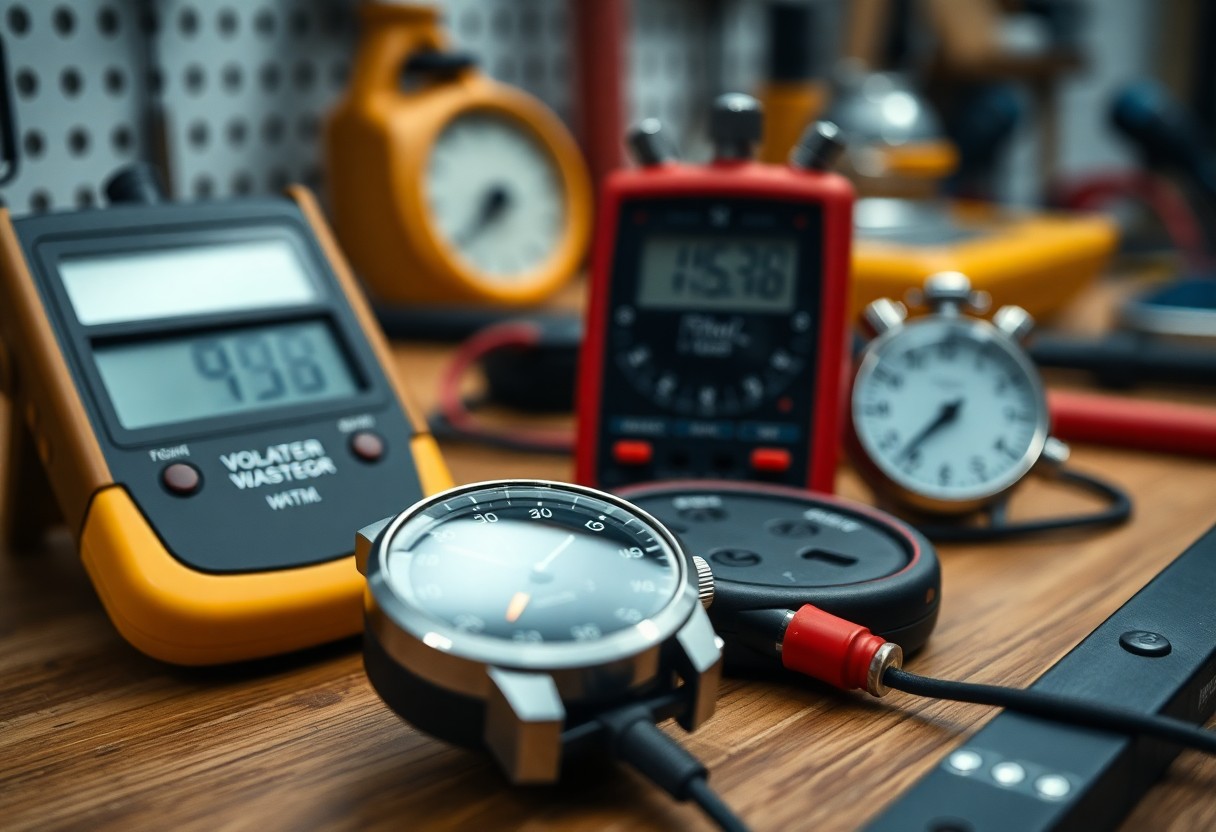Many watch owners often overlook the importance of battery care, which can significantly impact your timepiece’s longevity and performance. Understanding how to optimize your watch’s battery lifespan will not only save you money on replacements but also ensure your watch runs accurately and efficiently. By following these practical tips, you can enhance your watch’s battery life and enjoy its reliable service for years to come. From proper storage to routine checks, these insights will help you take better care of your valuable accessory.
Key Takeaways:
- Regular Maintenance: Schedule periodic check-ups at a professional watch service to ensure proper function and battery performance.
- Optimal Storage: Store your watch in a cool, dry place away from extreme temperatures and humidity to extend battery life.
- Avoid Excessive Use of Features: Minimize the use of features like backlighting and alarms to help preserve battery longevity.
Understanding Watch Batteries
Before you can make the most of your timepiece, it’s important to understand how watch batteries function. These small power sources are key to keeping your watch running smoothly and accurately. By familiarizing yourself with their lifespans and maintenance, you can enhance the performance and longevity of your favorite accessory.
Types of Watch Batteries
Between the different varieties, you’ll find that watch batteries come in a range of types suited for various timepieces. Here’s a quick overview:
| Type | Description |
| Silver Oxide | Common in quartz watches, long-lasting. |
| Lithium | Higher capacity, used in digital watches. |
| Alkaline | Less expensive, but shorter lifespan. |
| Rechargeable | Requires specific charging mechanisms. |
| Button Cell | Small size, used in various applications. |
Thou can choose the right battery type based on your timepiece’s requirements to ensure optimal performance.
How Watch Batteries Work
Work begins when electrical energy stored in the battery is converted into power to drive your watch’s mechanism. This energy flows through circuits, activating the quartz crystal that regulates timekeeping. With a better understanding of this process, you can appreciate the engineering behind your watch and take steps to maintain its functionality.
Types of batteries feed energy into your watch, enabling it to operate. The chemical reactions inside the batteries produce a continuous flow of electrical energy. Regular inspection and replacement of batteries can prevent leaks that may damage your watch. It’s vital to use the correct battery type to ensure your watch operates at peak efficiency. Fortunately, modern advancements make battery replacements easy, allowing you to enjoy your timepiece without interruption.

Factors Affecting Battery Lifespan
Even the most well-crafted watches can experience variations in battery lifespan due to several factors, such as:
- Type of Battery
- Electrical Functions
- Temperature
- Age of the Watch
- Usage Patterns
Thou should consider these elements to maximize the health of your timepiece.
Usage Patterns
For optimal battery performance, your usage patterns play a significant role. Watches with complex features, such as backlighting, alarms, or continuous activity tracking, will consume more energy compared to simpler models. Consider how often you’re activating these features and adjust your habits to extend battery life.
Environmental Influences
Below, the environment can significantly affect your watch’s battery performance. Exposure to extreme temperatures or humidity can negatively impact battery efficiency. Additionally, magnetic fields and physical shocks can lead to premature battery failure. These conditions can cause the battery to drain faster or even damage watch components.
Even subtle changes in your surroundings can impact your watch’s battery. For instance, keeping your watch in a hot or humid environment can lead to increased evaporation inside the battery, while exposure to cold temperatures may cause the battery to die unexpectedly. Being mindful of magnetism, like that from electronics, is necessary since it can disrupt the internal circuitry. By taking precautions against these environmental factors, you can ensure a longer lifespan for your watch battery.

Maintenance Tips for Prolonging Battery Life
Not all watch batteries last forever, but you can take steps to extend their lifespan. Follow these tips to maintain your timepiece and maximize its durability:
- Keep your watch clean: Dirt can affect battery performance.
- Avoid extreme temperatures: Heat and cold can drain the battery faster.
- Set your watch correctly: Avoid excessive adjustments that can wear the battery.
Any effort you make in caring for your watch will yield greater longevity for its battery.
Regular Servicing
Against the backdrop of daily wear, scheduling routine check-ups for your watch ensures that the battery and other components remain in optimal condition. A trained professional can identify and rectify any potential issues before they escalate, which helps preserve your watch’s functionality and battery life.
Proper Storage Practices
Below are some effective strategies you can implement to safeguard your watch when you’re not wearing it. Keep your timepiece in a dry, cool place to prevent moisture buildup, which can corrode the battery contacts. Also, store the watch in a dedicated box or case to protect it from physical damage. Ensure that the watch is not in constant sunlight, as this can degrade the materials and affect battery performance negatively.
Regularly inspecting your storage environment is vital. Ensure where you keep your watch is temperature-controlled and free from humidity. Exposure to moisture and heat can lead to battery corrosion or leakage, both of which can result in permanent damage. If you need to store your watch for an extended period, consider removing the battery to avoid any risks associated with leaking or swelling. These practices can significantly enhance your watch’s lifespan, keeping it operational for years to come.
Signs It’s Time to Replace Your Battery
Your watch may show signs it’s time for a battery replacement when it starts to run slow or stops entirely. If you have multiple wrist watches, do you pull out the crown to save battery? If so, this habit can be handy, but you need to pay close attention to the timekeeping ability of your most used timepiece.
Decreased Performance
Around the time your watch begins to show decreased performance, you may note irregular ticking or complete cessation of movement. These signs indicate that the battery is running low, and you should consider a replacement soon to maintain accuracy.
Visible Damage
Damage to your watch can sometimes imply that the battery needs replacing. You may notice issues with the casing, such as cracks or corrosion.
Visible signs of damage can not only affect the watch’s performance but also expose internal components to moisture and dirt, which can lead to further issues. Look out for a leaking battery that can cause corrosion, or any indication of rust forming around the watch’s case. Regularly inspecting your timepiece ensures that you keep it in the best condition possible and can help you catch problems before they escalate.

DIY Battery Replacement vs. Professional Service
Many watch enthusiasts consider whether to tackle a battery replacement themselves or to leave it in the hands of a professional. While DIY can save you money and time, it also comes with its own set of challenges. Understanding the pros and cons of each approach can help you decide the best course of action for your timepiece.
Pros and Cons of DIY Replacement
Pros vs. Cons
| Cost-effective | Risk of damaging the watch |
| Convenient timing | Requires specialized tools |
| Skill development | May void warranty |
| Satisfaction of self-repair | Potential for improper installation |
| Access to online tutorials | Limited troubleshooting support |
When to Seek Professional Help
When your watch is not functioning properly even after a battery replacement, it’s time to consider a professional service.
In addition, if your watch is an expensive or vintage piece, seeking help from a trained technician can be beneficial. Professionals have the experience to handle intricate mechanisms and can address underlying issues beyond the battery. With their expertise, they ensure your watch remains in optimal condition and avoids any potential damage that you might inadvertently cause. Investing in professional help is wise for maintaining the integrity and longevity of your timepiece.
Eco-Friendly Battery Disposal Options
Despite the convenience of modern batteries, it’s imperative to dispose of them responsibly. When your watch battery runs out, consider exploring options for eco-friendly disposal to minimize environmental impact. For more insight, you can check out Watch Tip: How to Prolong your Watch Battery – Jewelsmith. This ensures you’re informed about proper care and disposal of your timepiece.
Recycling Programs
For effective battery disposal, look for local recycling programs that accept watch batteries. Many stores and community centers offer drop-off options, ensuring these batteries are handled safely. By participating, you contribute to reducing landfill waste and environmental pollution.
Safe Disposal Methods
Disposal of batteries should always follow safety guidelines to prevent potential hazards. Check local regulations regarding battery disposal to find designated recycling facilities or scheduled collection events. It’s vital not to throw batteries in regular trash as they can leak harmful chemicals and pose significant risks to the environment.
Disposal of your watch batteries inappropriately can lead to the release of toxic materials into the soil and water supply. By utilizing recognized disposal methods, you effectively reduce the potential for environmental damage. Opt for local hazardous waste collection events or stores with proper recycling programs to ensure a safe farewell to your old batteries. Prioritizing eco-friendly methods helps maintain the planet’s health while responsibly managing your watch maintenance needs.
To wrap up
Considering all points, extending your watch battery lifespan boils down to simple habits and mindful practices. You should store your timepiece away from extreme temperatures, maintain regular cleaning, and utilize energy-saving features when available. Additionally, being cautious with water exposure and knowing when to replace your battery can enhance its longevity. By implementing these tips, you can significantly maximize the life of your watch battery and enjoy your timepiece for years to come.
FAQ
Q: How can I extend the lifespan of my watch battery?
A: To maximize the lifespan of your watch battery, consider the following tips: First, avoid exposing your watch to extreme temperatures, as both heat and cold can impact battery performance. Secondly, store your watch in a cool, dry place when not in use. Lastly, minimize the use of features that drain the battery quickly, such as backlighting or alarms, especially in quartz watches.
Q: Is it necessary to replace the battery in my watch regularly?
A: Yes, regular battery replacement is advisable to ensure your timepiece functions correctly. Generally, watch batteries last between 1 to 5 years, depending on the type of watch and its energy consumption. If your watch stops or begins to lose time, it’s a good indication that the battery needs to be replaced. Keeping an eye on these signs can help maintain the watch’s accuracy.
Q: Can I replace the watch battery myself, or should I seek professional help?
A: While some individuals opt to replace the watch battery themselves, it is often best to seek professional assistance. Doing so ensures that the battery is replaced correctly and helps avoid potential damage to the timepiece. Many watch repair shops offer battery replacement services tailored for different watch types, providing peace of mind along with your enhanced timekeeping.



